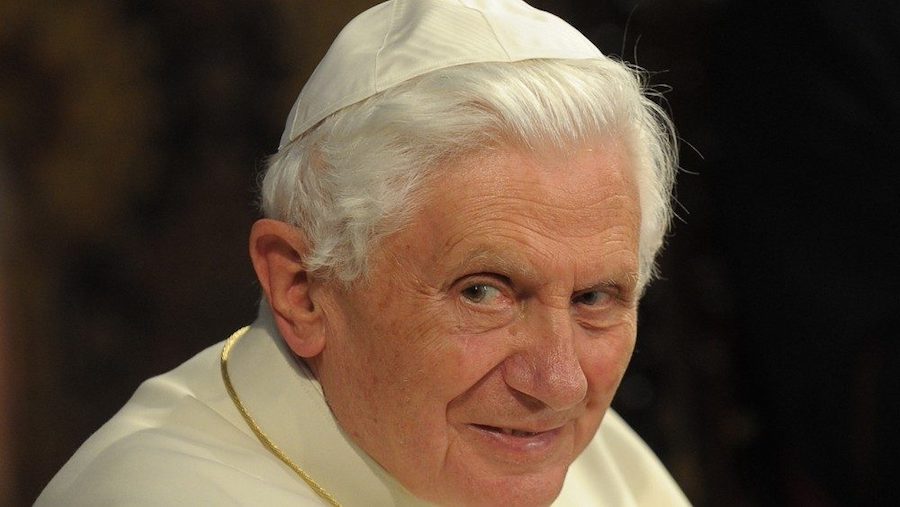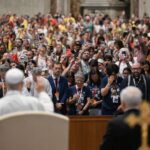BENEDICT XVI (1927-2022)
The Legionaries of Christ join in prayer for the eternal rest of Benedict XVI. During his pontificate, he guided us in the renewal of the charism of the entire Regnum Christi family.
With great sorrow and sadness, and at the same time with Christian hope and joy of the resurrection, we pray for the eternal rest of Benedict XVI. We owe him much, for under his pontificate and paternal tutelage, through his Pontifical Delegate, he guided us through difficult years to uncover the truth about our history, and we began our processes of review and renewal of the charism of the entire Regnum Christi family. Rest in peace!
Cardinal Joseph Ratzinger, Pope Benedict XVI, was born in Marktl am Inn, Diocese of Passau (Germany), on April 16, 1927 (Holy Saturday), and was baptized that same day. His father, a gendarmerie commissioner, came from an old farming family in Lower Bavaria, with rather modest economic conditions. His mother was the daughter of artisans from Rimsting, on Lake Chiem, and before marrying, she worked as a cook in various hotels.
His youth was not easy. The faith and education of his family prepared him to face the harsh experiences of those times, when the Nazi regime maintained a climate of strong hostility against the Catholic Church. Young Joseph saw how Nazis beat the parish priest before the celebration of the Holy Mass.
Precisely in this complex situation, he discovered the beauty and truth of the faith in Christ; for this, the attitude of his family was fundamental, which always gave a clear testimony of goodness and hope, rooted in a conscious belonging to the Church.
From 1946 to 1951, he studied philosophy and theology at the Higher School of Philosophy and Theology of Freising and at the University of Munich.
He was ordained a priest on June 29, 1951.
In 1953, he earned a doctorate in theology with the thesis: “People and House of God in the Doctrine of the Church of Saint Augustine”.
After serving as a professor of dogmatic and fundamental theology at the Higher School of Philosophy and Theology of Freising, he continued his teaching activity in Bonn from 1959 to 1963; in Münster from 1963 to 1966; and in Tübingen from 1966 to 1969. In that last year, he became a full professor of dogmatic and history of dogma at the University of Regensburg, where he also served as vice president of the university.
From 1962 to 1965, he made a notable contribution to the Second Vatican Council as an “expert”; he served as a theological consultant to Cardinal Joseph Frings, Archbishop of Cologne. In 1972, together with Hans Urs von Balthasar, Henri de Lubac, and other great theologians, he founded the theology journal “Communio”.
On March 25, 1977, Pope Paul VI appointed him Archbishop of Munich and Freising. On May 28 of that year, he received episcopal consecration. He was the first diocesan priest in 80 years to assume the pastoral governance of the great Bavarian archdiocese. He chose the episcopal motto: “Collaborator of the Truth”. He explained: “On the one hand, it seemed to me that this was the relationship between my previous role as a professor and my new mission. Despite the different modes, what was at stake and continued to be was to follow the truth, to serve it. And, on the other hand, I chose that motto because today’s world almost completely omits the theme of truth, as it seems too great for man, yet everything collapses if truth is missing”.
Paul VI made him a cardinal, with the title of Santa Maria della Consolazione in Tiburtino, in the consistory of June 27 of that same year.
John Paul II appointed him Prefect of the Congregation for the Doctrine of the Faith, and President of the Pontifical Biblical Commission and the International Theological Commission on November 25, 1981. On February 15, 1982, he resigned from the pastoral governance of the Archdiocese of Munich and Freising. He was elevated to the order of bishops, assigned to the suburbicarian see of Velletri-Segni, on April 5, 1993.
He was president of the commission for the preparation of the Catechism of the Catholic Church, which, after six years of work (1986-1992), presented the new Catechism to the Holy Father.
He was elected Pope on March 19, 2005, choosing the name Benedict XVI. When he appeared to the crowd from the main balcony of St. Peter’s Basilica, he said he was “a simple and humble worker in the Lord’s vineyard”. During his pontificate, he wrote 3 encyclicals: Deus Caritas Est (2005), Spes Salvi (2007), and Caritas in Veritate (2009).
During his pontificate, he was also the author of countless works, among which the three volumes on the life of Jesus of Nazareth stand out. There is also a rich range of theological thought, in various languages, in books about his homilies, speeches, reflections, catechesis, and interviews.
During his seven and a half years as Pope, he made 24 official trips. On December 12, 2012, Benedict XVI sent his first tweet to the digital world, creating the first Twitter account of a Pope.
“I have come to the certainty that my strength, due to my advanced age, no longer suffices for the exercise of the Petrine ministry. With full freedom, I declare that I resign from the ministry of Bishop of Rome and successor of Peter”, were the words of February 11, 2013, when Benedict XVI publicly announced his resignation as Pope, thus becoming Pope Emeritus. He retired to an ancient monastery, the Mater Ecclesiae, inside the Vatican. From there, he continued his life in an environment of prayer and silence, with some public interventions alongside Pope Francis and also through various writings published by the press.
On December 31, 2022, he passed away in Vatican City at the age of 95.










